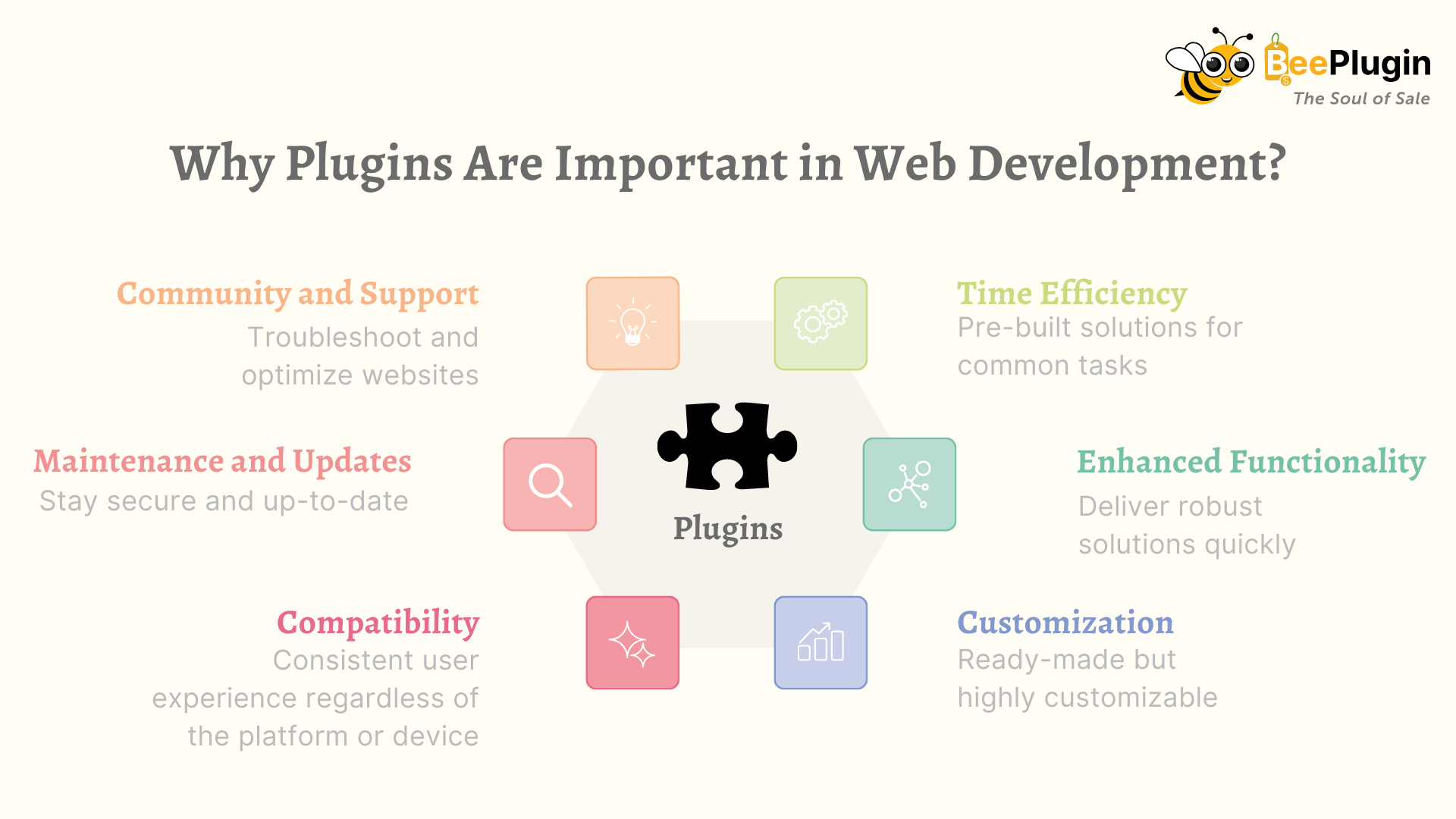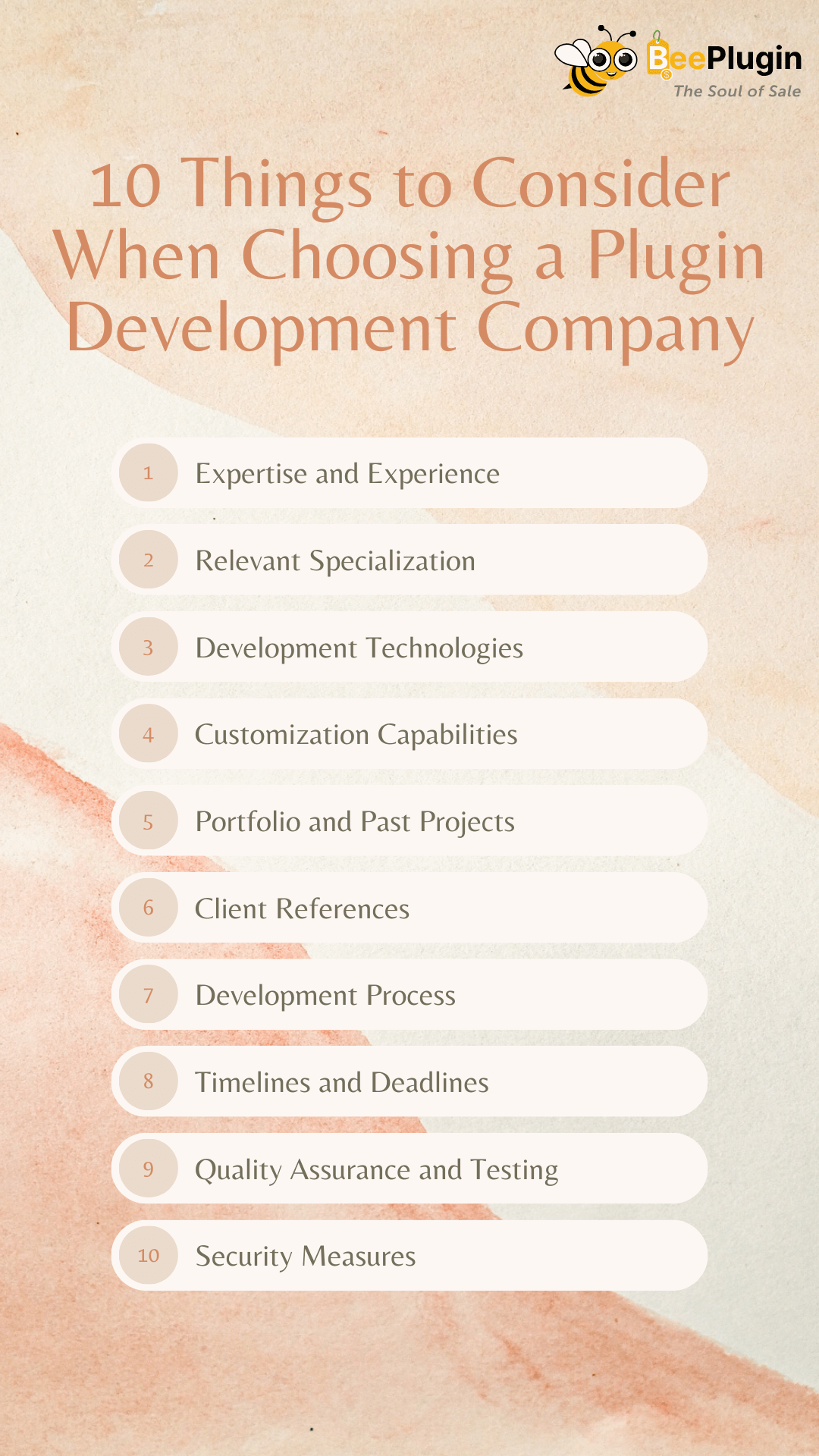In the ever-evolving landscape of WooCommerce development, staying ahead of the curve is crucial. As websites become more complex and feature-rich, the need for efficient and versatile tools has never been more apparent. This is where plugins come into play, revolutionizing the way websites are built and maintained.
In this blog, we’ll explore the importance of plugins in modern WooCommerce development and why they have become indispensable for developers worldwide.
Understanding Plugins
Before diving into the importance of plugins, let’s clarify what they are. In web development, a plugin is essentially a piece of software that adds specific features or functionalities to an existing system or application.
These can be used in various contexts, but they have gained immense popularity in website development. Plugins are typically modular and can be easily integrated into WooCommerce development frameworks, content management systems like WooCommerce, and other platforms.
The Versatility of Plugins
Plugins offer developers a remarkable degree of versatility. They cater to a wide range of needs, from simplifying routine tasks to extending the functionality of a website in novel ways.
Here are some key reasons why plugins have become indispensable in modern WooCommerce development:
 1. Time Efficiency
1. Time Efficiency
In the fast-paced world of web development, time is significant. Plugins enable developers to accelerate the development process by providing pre-built solutions for common tasks.
Whether it’s implementing social media sharing buttons, optimizing images, or adding a contact form, plugins save developers the time and effort of coding these features from scratch.
2. Enhanced Functionality
Modern websites require a plethora of functionalities, from e-commerce capabilities to SEO optimization. Plugins empower developers to add these features seamlessly.
Instead of dedicating extensive resources to develop complex functions, developers can rely on plugins to deliver robust solutions quickly and efficiently.
3. Customization
While plugins offer ready-made solutions, they are often highly customizable. Developers can tailor these plugins to meet the specific needs of their project, ensuring that they fit seamlessly into the design and functionality of the website. This flexibility is invaluable for creating unique and user-friendly websites.
4. Compatibility
Websites are accessed from a wide range of devices and browsers. Ensuring compatibility across this diverse landscape can be challenging.
Plugins are often developed and tested to work with various browsers, ensuring a consistent user experience regardless of the platform or device.
5. Maintenance and Updates
Plugins can simplify the process of maintaining and updating websites. Developers can rely on the plugin creators to release updates, bug fixes, and security patches, reducing the workload on their end. This ongoing support helps websites stay secure and up-to-date.
6. Community and Support
Many plugins come with active user communities and support forums. This means that if you encounter issues or have questions, you can often find solutions and guidance from other developers who have faced similar challenges. This community aspect can be invaluable in troubleshooting and optimizing your website.
What are the Benefits of Plugin Development?

Plugin development offers numerous benefits for both developers and users in various software ecosystems, including content management systems (CMS), web browsers, and other applications. Here are the key benefits of plugin development:
- Enhanced Functionality: Plugins extend the core functionality of software applications, allowing users to add new features and capabilities to their systems. This versatility not only enables users to customize software to meet their specific needs but also highlights the importance.
- Modularity: Plugins are typically modular components that can be added or removed without affecting the core functionality of the application. Such modularity simplifies maintenance, updates, and troubleshooting, further enhancing the flexibility of the software.
- Customization: Developers and users can create plugins to tailor software to their unique requirements, ensuring it can adapt to different industries, use cases, and business needs.
- Time and Cost Savings: Instead of developing new features from scratch, developers can leverage existing plugins to save time and resources. This is particularly advantageous for businesses looking to reduce development costs and accelerate time-to-market.
- Community Collaboration: Many plugin ecosystems have active communities of developers who contribute to the development and improvement of plugins. This collaborative environment fosters innovation and ensures that plugins remain up-to-date and secure.
- Scalability: Plugins allow software applications to scale effectively. As a system’s requirements change, users can easily add or replace plugins to accommodate new functionalities or accommodate growth.
- Security: Plugins can enhance security by offering features like authentication, access control, and data encryption. Developers can create security-focused plugins to fortify the software against vulnerabilities.
- Cross-Platform Compatibility: Plugins can be designed to work across different platforms and operating systems, providing a consistent experience for users regardless of their device or environment.
- User Experience: Plugins can improve the user experience by offering additional features, user interface enhancements, and accessibility improvements. This can lead to higher user satisfaction and engagement.
- Monetization: Developers have opportunities to monetize their plugins by selling them or offering premium versions with advanced features. This can be a lucrative business model for plugin developers.
Top Things to Consider When Choosing a Plugin Development Company

- Expertise and Experience: Look for a company with a proven track record in plugin development. Check their portfolio and client testimonials to gauge their experience and expertise in the field.
- Relevant Specialization: Ensure that the company specializes in the type of plugin development you need. Whether it’s for e-commerce, CMS, CRM, or another platform, expertise in your specific domain is essential.
- Development Technologies: Verify that the company is well-versed in the technologies and programming languages required for your project. This includes knowledge of APIs, databases, and web frameworks.
- Customization Capabilities: Assess the company’s ability to create highly customized plugins tailored to your unique requirements. A one-size-fits-all approach may not meet your specific needs.
- Portfolio and Past Projects: Review the company’s past projects and plugin examples. This will give you insights into their design aesthetics, functionality, and overall quality of work.
- Client References: Request client references and contact previous clients to inquire about their experiences working with the company. This can provide valuable insights into their professionalism and project management.
- Development Process: Understand the company’s development process. A transparent and well-structured approach with clear milestones and communication channels is crucial for project success.
- Timelines and Deadlines: Discuss project timelines and deadlines. Ensure that the company can deliver within your desired timeframe, and that they have a process in place for handling delays or unexpected issues.
- Quality Assurance and Testing: Inquire about the company’s quality assurance and testing processes. Rigorous testing is essential to ensure that the plugin functions flawlessly and is free of bugs.
- Security Measures: Security is paramount, especially for plugins that handle sensitive data. Ensure that the company follows industry best practices for security and data protection.
Risks and Considerations
While plugins offer numerous advantages, it’s essential to be aware of potential drawbacks. Using too many plugins can lead to performance issues and security vulnerabilities.
Therefore, it’s crucial to select plugins judiciously, regularly update them, and monitor their impact on your website’s performance.
Conclusion
In modern WooCommerce development, plugins have evolved from optional add-ons to essential tools for building feature-rich, efficient, and user-friendly websites.
Their versatility, time-saving capabilities, and customizability make them indispensable for developers looking to stay competitive in a dynamic digital landscape.
However, it’s important to strike a balance between using plugins and maintaining the performance and security of your website.
With careful selection and management, plugins can be a powerful asset in your web development toolkit, helping you create websites that meet the demands of the modern online world.


 Article
Article
 Infographic
Infographic
 Plugin Development
Plugin Development
 WordPress Development
WordPress Development
 WooCommerce Development
WooCommerce Development






Jay